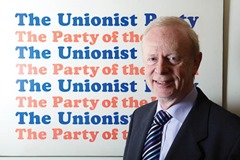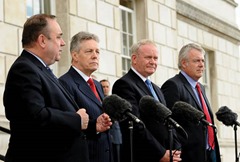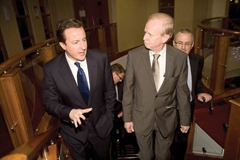Westminster: the UUP perspective
 Reg Empey talks to Peter Cheney about his work in the House of Lords and how it connects with the economy. Tackling underachievement, he says, will help to restore stability after the flags and parading disputes.
Reg Empey talks to Peter Cheney about his work in the House of Lords and how it connects with the economy. Tackling underachievement, he says, will help to restore stability after the flags and parading disputes.
The Ulster Unionist Party has had a presence at Westminster since its formation during the home rule crisis, one which continues with its three seats in the House of Lords.
It lost its MP, Sylvia Hermon, in March 2010 but Reg Empey was appointed to the Upper House the following January. He sits with Dennis Rogan, who joined the Lords in 1999. James Molyneaux has been on leave of absence since 2012.
Empey describes the party’s role there as “very active.” He points to how it pressed the Government on allowing an official opposition in the Assembly.
“We very much believe that all of Northern Ireland’s representatives should take their place in Parliament,” Empey remarks. When it’s put to him that abstention is a matter of conscience for Sinn Féin, he contends that republicans have already toasted the Queen and agreed to serve in a devolved administration within the UK. Several SNP and Plaid Cymru members are also openly republican yet those parties sit in the Commons. “Their case is thin and getting thinner,” he says of abstentionism.
Westminster determines “the main thrust of economic policy” and it also “sends the cheques” to the Executive. “We must remember that we have devolved administrations,” he adds. “The powers that they possess are entirely at the disposal of Parliament.” As a matter of protocol, the UK Government does not intervene in devolved matters although Empey argues that this was broken (unlawfully) by the on-the-runs deal with Sinn Féin.
Commenting on the DUP’s approach, Empey recalls how Ian Paisley reportedly told Martin McGuinness that they could run Northern Ireland better than it had been run from Westminster.
“That’s not a conversation that an Ulster Unionist would have had with Martin McGuinness,” he adds. “We don’t see ourselves as Ulster nationalists. We see ourselves as part of a nation and Westminster sets the rubric and the parameters for us.”
Empey receives the government whip but is not obliged to take it. He senses a “sullen acceptance” of coalition between the Conservatives and Liberal Democrats; the junior party’s peers are “anti-government politicians” and “regularly rebel”. The Conservatives thought that the cut to parliamentary constituencies was “in the bag” until the Lib Dems withdrew from the deal.
“The last thing Nick Clegg wants is for either of the major parties to win,” he adds. “He sees himself as holding this middle ground, no matter who comes along, so that he can still be in government.” Based on that attitude, he thinks that Labour or the Conservatives “would be sorely tempted to go it alone” with a minority government after the next election.
The House of Lords has a level of influence that would surprise many voters. The Coalition Government, though, has been defeated more than 60 times in the upper house e.g. over the European Union (Referendum) Bill. Furthermore, 95 per cent of Lords amendments are accepted by the Commons.
Empey notes: “Some of the bills that come into the House are in such a bad state that how they ever get through the Commons, I don’t know – probably just the whips – but the legislation is radically transformed by the time it comes out.”
Coming from a business background, and as a former Enterprise Minister, Empey places a high importance on the economy in his work. He takes up a committee position for each session and these have so far covered SMEs and personal service companies.
Separately, he is Vice-Chair of the All-Party Parliamentary Group on Aerospace and a member of the British-Irish Parliamentary Assembly and the British-American Parliamentary Group. Empey attended the Lords on 150 out of 155 sitting days in the last session and is satisfied that he is representing Northern Ireland well.
Confidence
The conversation turns to the Assembly and the current state of the political process.
“As time has passed more and more people realise that strategically, while far from perfect, the fundamentals of 1998 we probably got right,” he says.
The St Andrews changes have been “for the worse” by replacing a partnership – the joint election of the First and deputy First ministers – with a “sectarian headcount” by giving the First Minister’s post to the largest party after the election.
The partnership aspect was “painstakingly negotiated” in 1998 but removed by Tony Blair in a side deal with Sinn Féin. Empey sees the resulting “stalemate” as leading to poor delivery on policy.
 “We haven’t really rebalanced our economy,” he adds. “We’re roughly where we were in 2004 in terms of earnings and the public sector still rules.” Empey welcomes the Executive’s ability to attract inward investment but a “step change” is needed, preferably by cutting corporation tax.
“We haven’t really rebalanced our economy,” he adds. “We’re roughly where we were in 2004 in terms of earnings and the public sector still rules.” Empey welcomes the Executive’s ability to attract inward investment but a “step change” is needed, preferably by cutting corporation tax.
Most working class communities “basically don’t feel that they’re better” as a result of the Belfast Agreement yet Stormont “should by now have made an impact” on poor exam results and pockets of unemployment with its power and resources.
“As long as that source of instability is there, you get the instability that you’ve seen in the last 18 months continuing to pop up,” Empey states. “It has to be fixed.”
Someone living in Cultra, for example, may think that this is nothing to do with them but “it is everything to do with you because as long as that remains unresolved, we will never get Northern Ireland out of the headlines for trouble.”
Empey blames the Alliance Party for creating “a whole new class of protester” over the flags dispute but, when challenged, acknowledges that it is “fair enough” that the UUP and DUP leaflets also played a part in encouraging protest. The Parades Commission’s decision over the Ardoyne parade, he adds, was impossible to understand and worsened the situation.
“So all of that contributes to this alienation, to this lack of achievement, to this feeling that there’s nothing left,” he continues. The new council boundaries, Empey predicts, will add to tension as many parts of East Belfast will lie outside the city. The UUP has contended that this was a political deal to leave Sinn Féin as the largest party in Belfast and the DUP the largest party in Lisburn and Castlereagh.
All the data is available and now is the time for action, he contends. A culture that undervalues education is at the root of the problem and people need to make a link between achieving qualifications and getting out of poverty.
Towards 2015
Westminster is “extremely relevant because it sets the tone” for politics and is also fundamental to the east-west relationship between the UK and the Republic. He expects the two governments to work closely in the negotiations on EU reform: “That relationship is strong and I think it will be enduring.”
Looking ahead towards the next election, Empey points out that the UK’s deficit is still being funded by asset sales and borrowing. Governments will therefore need to tackle the welfare budget which takes up the largest share of the state’s resource spending.
Without cutting the deficit, the markets could – quite suddenly – still lose confidence in the UK economy. The early rhetoric of austerity “didn’t match what was happening” as public spending has increased since the Coalition Government came to power.
“We’ve got to move the money away from mortgages and into concentrating on SMEs and people who can actually export and earn us the money,” he proposes.
Regardless of who wins, the “London-centric nature” of Parliament will need to be overcome. When he arrived, meetings were often called at 9 o’clock in the morning which suited peers living in London but not those who had to make longer journeys.
“Virtually all the staff and most of the members come from London and the South East,” he explains, “and they don’t get the distances that some people have to travel to get there.” The major parties need to learn that London is “not the centre of the universe” and indeed it is “almost despised” in the English regions.
To use one contemporary example, the HS2 rail link is presented as opening up northern England to new investment but could have the opposite effect by taking more commuters to work in London more quickly. “It may or may not actually improve the wealth of the North of England,” he maintains.
“They see the people in London as a different race of people,” Empey says of the English regions’ residents.
Londoners are “wealthy in many cases” and form a metropolitan élite with different values “and I think there’s a great danger that as London gets wealthier, the regions get poorer.”
The Scottish question
“The irony was that the last British Government was run by Scotland,” Empey quips.
At various stages, the Prime Minister, Chancellor, Home Secretary and Defence Secretary were all Scottish MPs. He’s therefore surprised at the “lacklustre” campaigning by Labour, which has “more to lose than anybody else.”
If a ‘yes’ vote did happen, a UK-wide general election would still happen next May.
Ed Miliband could potentially have a Commons majority of 30, bolstered by around 40 Scottish Labour MPs. English voters would see a Government formed in that way as “illegitimate”. It’s also unclear how the many Scottish peers could be extracted from the House of Lords.
Northern Ireland passengers could find themselves paying higher air passenger duty on “international” flights to Glasgow and some customs controls will be put in place. Republicans would press for a border poll and it would “start to re-open old wounds.”






